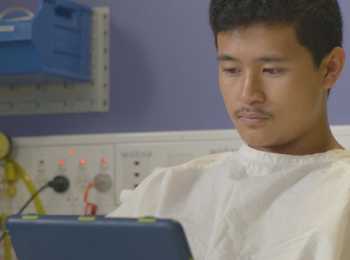Contents
Part 2
Supporting your partner
Your partner will need a lot of support (practical and emotional) throughout their cancer journey.

The role you take on in terms of supporting your partner will depend on what the status of your relationship is. If you are living together then you may take on a much bigger role in caring for your partner, whereas if they live with their parents, or move back home, you may be less involved in the day-to-day caring role.
Whatever role you take on it will bring some big changes for you and it may take time to adjust. It can be pretty tough trying to balance it with everything else going on in your life like work, study and other commitments.
Remember: You don’t have to do this all on your own.
A carer is the term used to describe someone who helps and supports someone through a disease like cancer. You may not see yourself as a carer but simply someone taking care of the person you love.
Every situation is different and what you do will depend very much on your situation and what your partner needs and wants from you. However, if you are a full time carer, then it is important to find ways to share the load with other family members and friends. There are lots of roles that you might take on as part of supporting your partner.

Some of the roles you might take on include:
Dealing with doctors and other members of the health team
This can be quite a scary thing especially if you haven’t had much to do with doctors, nurses and treatment centres before. It may feel like they are all speaking another language and that there are a whole lot of new “customs” and “rituals” from another planet.
But getting a handle on what is happening is really important. You have a right to be included as part of your partner’s care team. Don’t be afraid to ask questions, let healthcare professionals know when you don’t understand something, and ask for more information if you think it will help.
You may feel excluded from important conversations because health professionals or family members may not recognise your role. If you are feeling excluded it’s OK to let your partner know how you are feeling and talk about ways for you to be included.
It’s always a good idea to keep checking in with your partner to make sure that you know what their needs or wants are. While it’s easier said then done – keeping open and honest communication going will help to make this a lot less stressful for everyone.
Note Taker
Often when you are stressed, you don’t remember everything that is said to you – especially when it involves medical stuff. You may be surprised to find that both you and your partner hear different things when you go to Dr’s appointments – or that you both miss stuff.
A great way to support your partner is to take notes during the appointment, or even record it on a smart phone or other device, so that you can refer back to it at another time.
Paper organiser
You will be amazed by how much paperwork gets generated by a cancer diagnosis – bills, receipts, referral letters, scripts, scans, X-rays, blood test results. It’s a good idea to keep them in one place. You might end up being the person who looks after these so you can find them when you need to. If you need some help, this is one area where parents or friends can come in handy – they might have had some experience in organising paperwork.
Drug Manager
Your partner may be taking prescription and non-prescription medications. You can help them by being informed about what they are taking and when they need to take them. A 7-day pillbox is a great idea (you can get these from a chemist) – you just put in all the meds they need to take each day of the week. There are also some great apps that you can get to remind you when and what they have to take, or you can download it for them.
Physical Carer
When your partner returns home they might also require help with their personal care (washing, dressing etc.) or with physical tasks (such as getting in and out of bed).
Communicator
It’s likely that your partner will need to take time out from work or study and they might need your help to communicate with their employer or educational institution about their progress.

Best friend
Your partner is going to be on an emotional rollercoaster and might need support from you in terms of giving them a shoulder to cry on, someone to laugh with to lighten the mood or someone to vent to about how unfair everything is at the moment.
Other support
There are many ways to help other than the more traditional ones that people think of like cooking, cleaning, and taking them to Dr’s appointments.
Other support can include:
- Keeping friends in the loop – updating Facebook, tweeting or posting on instagram (check with your partner first as to what they are happy to share).
- Answering questions so that your partner doesn’t have to keep repeating the same stuff.
- Coordinating visits.
- Being their social organiser
These things can be incredibly important in helping them to have an outlet and focus, other than being the “cancer patient”.
Sometimes it can be helpful to get your partner to let you know what would help to support them. Ask them to tick any of the things opposite that they want you to do including things you already do.
Remember: Sometimes your partner may feel like people are taking over and they want to feel more independent. Other times they may feel like a burden and they may not want to ask for help. Always check in with your partner to see how you can help.
Checklist
-
Discuss important decisions about my treatment with me.
-
Listen to me talk about my feelings.
-
Ask me how I am feeling (even if I am not feeling so good).
-
Tell me that you love me just the way I am.
-
Don’t avoid talking to me about tough stuff.
-
Don’t try to solve my problems.
-
Tell me how YOU are feeling.
-
Encourage me to exercise or exercise with me.
-
Just sit with me.
-
Give me some time alone.
-
Take messages, return phone calls or send texts for me.
-
Talk to me about things other than cancer.
-
Take me out.
-
Make me laugh (well try to).
-
Hug me.
-
Rub my back, feet, shoulders or hands.
-
Please accept there are some decisions I need to make on my own.
This checklist has been amended and reproduced with kind permission from the Cancer Council Queensland ‘Partners guide to coping with cancer’.

Finding support for you
All of this may seem really overwhelming and you might be worried that you can’t organise it all. A good idea is to write down the things that you already do and then work out what could be done by someone else. It’s important to involve your partner in this as there may be things that they only want you to do (showering, getting dressed, going to Dr’s appointments). It’s also OK to pick the things that you like to do – cooking and shopping, taking them out and then delegate the things you don’t like – cleaning, washing, ironing.
Certain things might freak you out like seeing your partner receive chemotherapy or going through other medical procedures. Sometimes finding out more information about what to expect and what your partner is going through can help. You might need to call on family or friends to help you out by being there to support your partner if you can’t.
"The support has come from going to appointments, chemotherapy and still trying to do fun things that she enjoyed that had NOTHING to do with hospitals, cancer, tests etc. to keep preoccupied in her quiet time when she felt well."
(Luke, 22 years whose partner has cancer)
Remember: Asking for help can be difficult but not asking can make an already hard situation harder.
Impact on your everyday life
Being the partner of someone who is living with cancer can mess with many parts of your life. There will be both big and small changes that you may have to deal with.
Your wellbeing
It’s likely that you will go through some major ups and downs. You might swing from one emotion to another (it’s actually possible to be happy and miserable at the same time). Some days your feelings may be so intense and out of control that you feel completely overwhelmed.
At different times you might feel:
- Annoyed
- Scared
- Jealous
- Uncertain
- Confused
- Numb
- Shocked
- Sad
- Embarrassed
- Nothing at all
- Angry
- Frustrated
- Left-out
- Lonely
- Over it
- Relieved
Remember: there is no right or wrong way to feel.

Living arrangements
Your partner may choose or need to move back in with their parents so that they can get looked after. This might be a relief for you or you may feel that your role has been taken over. It may also mean that they move to a different town or city. If you have been living together this will be a major change for both of you.
Working out what roles all of you play in supporting your partner will take some negotiating.
Depending on where they live, your partner may have to move so they can receive their treatment. Being separated from each other can put a whole lot of extra strain on your relationship. You might feel guilty for not being able to be closer but you might also feel relieved that you don’t have to be involved in the day-to-day care. Both reactions are OK. You could also feel excluded from some of the decision-making and also feel like you are the last one to know about treatment and care.
There are lots of ways to stay in touch and feel connected and involved in your partner’s care. Thank goodness for smart phones, iPads, Skype, snap chat, instagram and every other device and app that keeps you connected. It may just take a bit more planning.
Money matters
On top of everything else on your mind, you may be worried about how much all this cancer treatment is going to cost and how you are both going to manage financially. Having a partner with cancer can put financial pressure on you; they may not be able to work which will mean they can’t contribute to the rent and other household expenses, you may have to reduce your working hours to care for them. There could be increased expenses like medications, equipment and transport costs. If you are used to being independent, asking for financial assistance can be really hard.
Financial assistance
There are government agencies, charities and other organisations that exist to help people through tough times. There are government payments that you may be entitled to such as:
- Carer payment – if you live together and you provide most of the care. It’s income and means tested (depends on how much you both earn and how much money you have in the bank).
- Carer allowance – if you provide a significant amount of assistance either in your own home or where your partner is living. This isn’t means tested so you may be able to get it even if you are working or getting another government benefit.
There is no shame in applying for assistance. It’s there for all people in your situation no matter what your finances are like.
There is a lot more information on this in the Now What…? A young person’s guide to dealing with cancer book and there are links and contact details in the ‘Where to get more information and help’ section at the back of this booklet.
You and your partner might be eligible to receive:
- Rent assistance
- Carer’s assistance
- Unemployment assistance
- Pharmaceutical allowance
- Student assistance
- Concession cards
- Parking vouchers at the hospital
- Accommodation close to the hospital during treatment
- Transport costs to and from the hospital
Study and work
It’s likely that whilst you are supporting your partner you’ll also be trying to juggle study and/or work.

Work
If you are working full time you may be able to speak to your manager about flexible hours so that you can be around to care for your partner. You may need to take annual leave or personal leave.
Speak with the Human Resources (HR) Department at your workplace to find out what your entitlements are. If there isn’t an Human Resources Department then you will need to speak to your manager.
A lot of workplaces also have what’s called an Employee Assistance Program (EAP). This is a free and confidential counselling service that employees can access. Check if your workplace has a program.
There is no obligation to tell your manager anything about your personal situation, but you might find it’s helpful especially if you are finding it all a bit tough and need some time off. The same goes with your work colleagues. Who you tell is up to you (but you might need to respect your partner’s wishes about who they want to know).
For more information on your rights at work check out fairwork.gov.au
Study
How much your studies are affected may depend on what your caring role involves. However, don’t be surprised if you find concentrating on study difficult regardless of whether you are a full-time carer or not.
If you are finding it all a bit much then speak to your tutors and lecturers to let them know what is happening. There may be ways to reduce your workload, get extensions or special considerations for exams and assessments. Most campuses also have a Student Services Centre that provides support services such as counselling and financial assistance.
Remember: It's important to ask for help if you need it. Trying to juggle all of this can be really tough.
Looking after yourself
You will probably expect that your partner with cancer will be the main focus for family, friends and even well meaning strangers. The first question will usually be about how they are doing. But after a while you might start to feel like the invisible bystander; like your feelings and wellbeing are not an issue for anyone.
When you are looking after someone you love who has cancer it can be very easy to forget about yourself. It’s likely that you will feel that their needs at this time are far more important than yours and living with cancer trumps everything else.
You might think ‘How can you complain about being tired or having a bit of a headache when your partner has a mouth full of ulcers and can hardly drag themselves out of bed to have a shower?’
This isn’t a competition, but if you don’t look after yourself then you won’t be able to look after them. Taking care of yourself is not selfish – it’s good for both of you.

Things that can help:
- Try to keep doing things that you enjoy – going to the gym, playing sport, hanging out with friends or whatever other activities you are involved with.
- Find ways to be a partner, not just a carer.
- Don’t skip meals or rely on takeaway food. Eating healthily is important. If cooking isn’t your thing then this may be a good way to get support from friends and family.
- Go easy on the alcohol (and any other substances). Without the lecture, while they might feel like they’re helpful in the short term they aren’t good for your body or your mind in the long run.
- Take some time out to reflect on what you’re going through and what you’re feeling. Talking about how you’re feeling or writing it down can often help you make sense of your feelings and put them into perspective.
- If it all starts to feel a bit overwhelming, finding someone to talk to can really help. You may already have a great support network but sometimes this might not be enough. Seeing a counsellor or psychologist can be very helpful. Seeing a psychologist, or a social worker or occupational therapist with mental health training, can be very helpful. If you are diagnosed with a mental disorder (e.g. depression, anxiety) then a GP can organise a mental health treatment plan for you and refer you to one of these clinicians. Medicare will cover some of the cost of these sessions.
- You may feel like you are the only one dealing with this, so talking to someone else going through a similar experience can help. The support services (or health professionals) listed on page 27-29 may be able to link you in with others going through a similar experience to you.
- If there aren’t any support services in your area, you can look online for chat-rooms and forums for young people dealing with similar stuff. Sharing your experiences may help others too!
- While you may be used to partying, staying out late and not getting enough sleep – with the added emotional stress of caring for your partner – lack of sleep can make it all a whole lot harder.
- Going to the doctor may not be something that you have ever done regularly (most young people don’t). But it’s important to get things checked out if they are worrying you. You may find that you are more aware of aches and pains and that you are scared that they could be serious. This is not an uncommon response.
- Ask other family members and friends to help out so that you can get regular breaks.
- Protecting yourself from colds, coughs and the flu is important for yourself and your partner. Their immune system can be comprised by their treatment, which means they’ll be more at risk of getting infections. (You will also be able to better manage the extra stress of being a carer if you are feeling well).
- Take time everyday to do something for yourself – even if it’s just 10-15 minutes.
Remember: No matter what happens, you are not alone.

Video
7 ways you can support a partner with cancer
Learning that your partner has cancer can feel like having your whole world turn upside down. In this video from our video series, we go through 7 practical ways you can help your partner when they have been diagnosed with cancer.
























